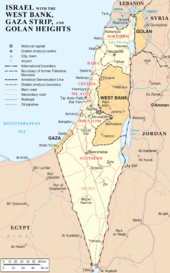- Saif al-Islam Gaddafi Isratin proposal
-
The Gaddafi Isratin proposal is a proposal to permanently resolve the Israeli–Palestinian conflict through a secular, federalist, republican one-state solution, which was first articulated by Saif al-Islam Gaddafi, the son of Muammar Gaddafi of Libya, at the Chatham House in London and later adopted by Muammar Gaddafi himself.
Its main points are:
- Creation of a binational Jewish-Palestinian state called the "Federal Israelian Republic of the Holy Land";
- Partition of the state into 5 administrative regions, with Jerusalem as a city-state;
- Return of all Palestinian refugees;
- Supervision by the United Nations of free and fair elections on the first and second occasions;
- Removal of weapons of mass destruction from the state;
- Recognition of the state by the Arab League.
Saif al-Islam Gaddafi's proposal was eventually incorporated in Libyan leader Muammar Gaddafi's White Book of 8 May 2003, which served as his official guide to address the Arab-Israeli conflict and how to solve it.[1] Despite the suggestion of "Federal Republic of the Holy Land" as the name of this hypothetical new state, the name Isratin (Hebrew: יִשְׂרָטִין, Yisratin; Arabic: إسراطين, Isrātin), a portmanteau of the names "Israel" and "Falastin" (Palestine in Arabic and Hebrew) - variously spelled in English as "Isratine" or "Israteen" and sometimes rendered "Israstine" - has been used as a "working title" for the notion of a single state in Israel, the West Bank and Gaza Strip, with Palestinians and Jewish inhabitants of all three having citizenship and equal rights in the combined entity.
Muammar Gaddafi again championed the "Isratin proposal" in an op-ed article for the New York Times as the "only option" for a solution to the Israeli-Palestinian conflict. The timing of the article approximately coincided with the inauguration of Barack Obama as President of the U.S. and with the cease-fire that apparently marked the end of the 2008-2009 Israel-Gaza conflict.[2][3] Gaddafi argued that this solution would avoid the partitioning of West Bank into Arab and Jewish zones, with buffer zones between them.[4]
See also
References
- ^ Al Gathafi, Muammar (2003). White Book (ISRATIN). http://www.algathafi.org/html-english/cat_03_03.htm. Retrieved 2008-04-16.
- ^ Qaddafi, Muammar (2009-01-21). "The One-State Solution". The New York Times. http://www.nytimes.com/2009/01/22/opinion/22qaddafi.html. Retrieved 2009-01-22.
- ^ "Gadhafi says US should seek peace with bin Laden". International Herald Tribune. Associated Press. 2009-01-21. http://www.iht.com/articles/ap/2009/01/21/america/NA-US-Libya.php. Retrieved 2009-01-22.
- ^ "Kadhafi calls for one-state solution for Palestine problem". Al Bawaba. http://www.albawaba.com/en/countries/Libya/239647.
Arab-Israeli peace diplomacy and treaties
- Paris Peace Conference, 1919
- Faisal-Weizmann Agreement (1919)
- 1949 Armistice Agreements
- Camp David Accords (1978)
- Israel-Egypt Peace Treaty (1979)
- Madrid Conference of 1991
- Oslo Accords (1993)
- Israel-Jordan Treaty of Peace (1994)
- Camp David 2000 Summit
- Peace process in the Israeli-Palestinian conflict
- Projects working for peace among Israelis and Arabs
- List of Middle East peace proposals
- International law and the Arab-Israeli conflict
Categories:- One-state solution
- Foreign relations of Libya
- Israeli–Palestinian peace efforts
- Muammar Gaddafi
Wikimedia Foundation. 2010.

